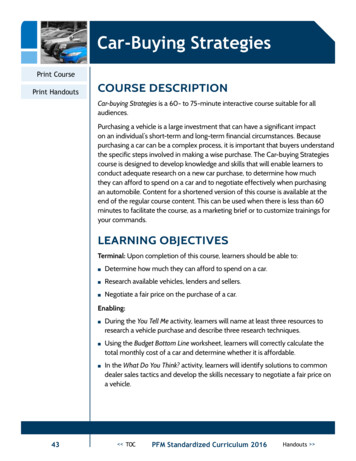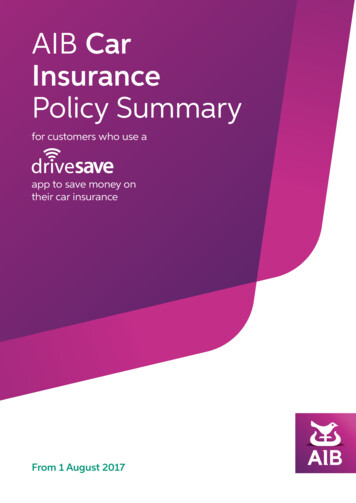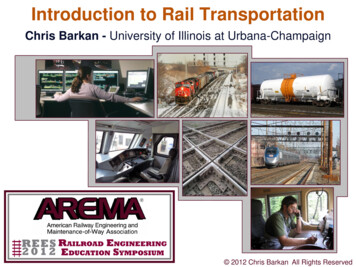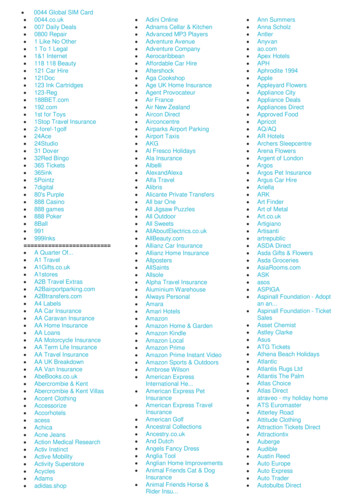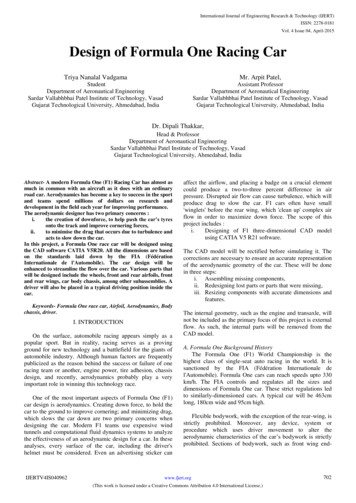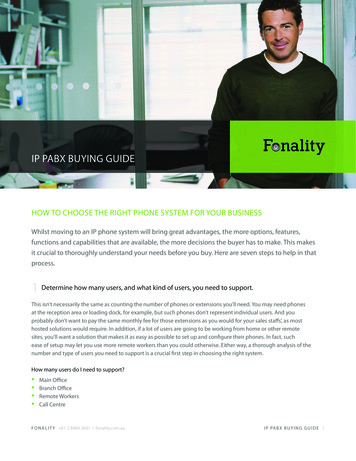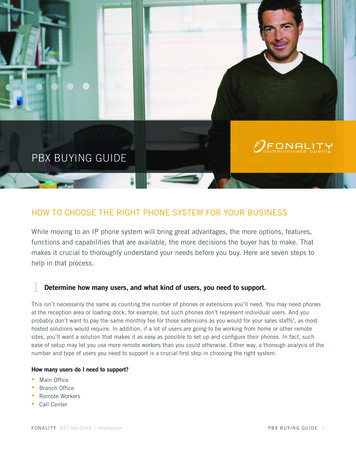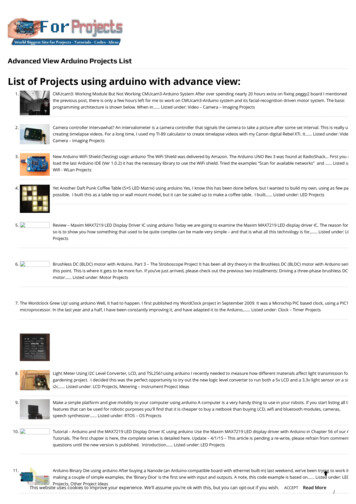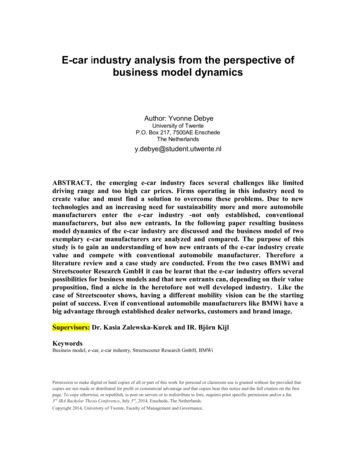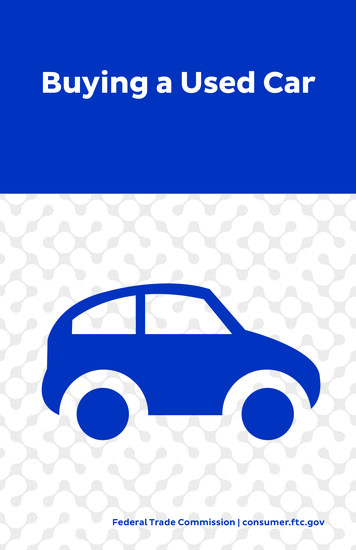
Transcription
Buying a Used CarFederal Trade Commission consumer.ftc.gov
ContentsBefore You Buy a Used Car . . . . . . . . . . . . . . . . . . . . . . . 1Pay in Full or Finance . . . . . . . . . . . . . . . . . . . . . . . . . . . 2Dealer Sales and the Buyers Guide . . . . . . . . . . . . . . . 3Warranties . . . . . . . . . . . . . . . . . . . . . . . . . . . . . . . . . . . . . 5As Is - No Dealer Warranty.5Implied Warranties. 6Implied Warranty of Merchantability. 6Implied Warranty of Fitness for a Particular Purpose.7Full and Limited Warranties.7Warranty Documents. 8Unexpired Manufacturer’s Warranties. 8Service Contracts . . . . . . . . . . . . . . . . . . . . . . . . . . . . . . 8An Independent Inspection Before You Buy . . . . . 10Private Sales . . . . . . . . . . . . . . . . . . . . . . . . . . . . . . . . . . 11If You Have Problems . . . . . . . . . . . . . . . . . . . . . . . . . . 12Sample Buyers Guide . . . . . . . . . . . . . . . . . . . . . . . . . . 14
Before you start shopping for a used car, do some homework.It may save you serious money. Consider your driving habits,what the car will be used for, and your budget. Research models,options, costs, repair records, safety tests, and mileage — onlineand through libraries and bookstores.Before You Buy a Used CarWhether you buy a used car from a dealer or an individual: Test drive the car under varied road conditions — on hills,highways, and in stop-and-go traffic. Ask for the car’s maintenance record from the owner, dealer,or repair shop. Determine the value of the vehicle before younegotiate the purchase. Check the NationalAutomobile Dealers Association’s (NADA) Guides(www.nadaguides.com), Edmunds (www.edmunds.com),Kelley Blue Book (www.kbb.com), and Consumer Reports(www.consumerreports.org). Some of these organizationscharge for this information. Research the upkeep costs for models you’re interested in,including the frequency of repairs and maintenance costs. Examine the car using an inspection checklist. You can findchecklists in magazines, books, and on websites that dealwith used cars. Check whether there are any unrepaired recalls on a vehicle.Start by asking the dealer if the vehicle you’re consideringhas a recall. You also can check yourself by entering the VINat safercar.gov, or by calling the National Highway TrafficSafety Administration’s (NHTSA) Vehicle Safety Hotline at1-888-327-4236. If there is a recall, ask the dealer to fix it, orto give you information showing it was fixed. Keep in mindthat federal law doesn’t require dealers to fix recalls on usedcars, so you might need to get the repair done yourself. Butdon’t wait — according to NHTSA, all safety recalls posesafety risks and, left unrepaired, might lead to accidents.1
Get an independentYou can investigate areview of a vehicle’scar’s history by its Vehiclehistory. Check aIdentification Number (VIN).trusted databaseservice that gathersinformation from state and local authorities, salvage yards,and insurance companies. For example, the Department ofJustice’s National Motor Vehicle Title Information System(NMVTIS) (nmvtis.gov) offers information about a vehicle’stitle, odometer data, and certain damage history. Expect topay a small fee for each report. The National Insurance CrimeBureau (NICB) (www.nicb.org) maintains a free databasethat includes flood damage and other information. Youcan investigate a car’s history by its Vehicle IdentificationNumber (VIN). You also can search online for companiesthat sell vehicle history reports. If the report isn’t recent oryou suspect that it has missing or fabricated information,verify it with the reporting company. The information inthe reports may not be complete, so you may want to geta second report from a different reporting company. Somedealer websites have links to free reports. Consider hiring a mechanic to inspect the car.Pay in Full or FinanceYou have two choices: pay in full or finance over time. Financingincreases the total cost of the car because you’re also paying forthe cost of credit, including interest and other costs. Consider howmuch you can put down, the monthly payment, the financing term(such as 48 months), and the annual percentage rate (APR). Ratesusually are higher and financing periods shorter on used cars thanon new ones.Dealers and other finance sources (like finance companies, creditunions, and banks) offer a variety of financing terms. Shop around,compare offers, and negotiate the best deal you can. If you’re afirst-time buyer — or if your credit isn’t great — be cautious aboutspecial financing offers. They can require a big down payment and2
a high APR. If you agree to financing that carries a high APR, youmay be taking a big risk. If you decide to sell the car before the end of the financingperiod, the amount you get from the sale may be less than theamount you need to pay off the financing agreement. If the car is repossessed or declared a total loss because ofan accident, you may have to pay a considerable amount torepay the loan even after the proceeds from the sale of the caror the insurance payment have been deducted.If money is tight, you might consider paying cash for a lessexpensive car.If you decide to finance, make sure you understand the financingagreement before you sign any documents. What is the exact price you’re paying for the vehicle? How much are you financing? What is the finance charge (the dollar amount the credit willcost you)? What is the APR (a measure of the cost of credit, expressedas a yearly rate)? How many payments will you make — and how much iseach one? What is the total sales price — the sum of the monthlypayments plus the down payment?Dealer Sales and the Buyers GuideUsed cars are sold through a variety of outlets: franchised andindependent dealers, rental car companies, leasing companies, usedcar superstores, and online. Ask friends, relatives, and co-workersfor recommendations. Contact your local consumer protectionagency (www.usa.gov/state-consumer) and state Attorney General(www.naag.org) to find out if any unresolved complaints are on fileabout a particular dealer. You also can search online for reviews orcomplaints. Enter the name of the seller and the word “review” or“complaint” into a search engine.3
Some dealers attract customers with “no-haggle prices,” “factorycertified” used cars, and better warranties. Consider the dealer’sreputation when you evaluate its ads.Dealers are not required by federal law to give used car buyers athree-day right to cancel. In some states, dealers are required togive a right to cancel. In other states, the right to return the car in afew days for a refund exists only if the dealer chooses to offer thisprivilege. Dealers may describe the right to cancel as a “coolingoff” period, a money-back guarantee, or a “no questions asked”return policy. Before you buy from a dealer, ask about the dealer’sreturn policy, get it in writing, and read it carefully.The Federal Trade Commission’s (FTC) Used Car Rule requiresdealers to display a Buyers Guide in every used car they offer forsale, and to give it to buyers after the sale. This includes lightduty vans, light-duty trucks, demonstrators, and program cars.Demonstrators are new cars that haven’t been owned, leased, orused as rentals, but have been driven by dealer staff. Program carsare low-mileage, current-model-year vehicles returned from shortterm leases or rentals. Buyers Guides do not have to be posted onmotorcycles and most recreational vehicles. Anyone who sells, oroffers for sale, fewerThe FTC’s Used Car Rule requiresthan six cars in adealers to post a Buyers Guide inyear doesn’t have toeveryused car they offer for sale.post a Buyers Guide.The Buyers Guide tells you: the major mechanical and electrical systems on the car,including some of the major problems you should look out for; whether the vehicle is being sold “as is” or with a warranty; what percentage of the repair costs a dealer will pay underthe warranty; to get all promises in writing; to ask to have the car inspected by an independent mechanicbefore you buy;4
to get a vehicle history report and to visit ftc.gov/usedcarsfor information on how to get a vehicle history report, how tocheck for safety recalls, and other topics; to ask for a Spanish Buyers Guide if the sale is conducted inSpanish; the dealer’s contact information, including the contact forcomplaints; and to remember: spoken promises are difficult to enforce.Keep the Buyers Guide for reference after the sale.Maine and Wisconsin are exempt fromthe FTC’s Used Car Rule. Those statesrequire dealers to display a differentversion of the Buyers Guide.A sample of theBuyers Guide is onpages 14 - 16.WarrantiesWhen you buy a used car from a dealer, the Guide must reflect anynegotiated changes in warranty coverage. It becomes part of yoursales contract and overrides any contrary provisions. For example,if the Buyers Guide says the car comes with a warranty and thecontract says the car is sold “as is,” the dealer must give you thewarranty described in the Guide.As Is - No Dealer WarrantyWhen the dealer offers a vehicle “as is,” the box next to the “AsIs - No Dealer Warranty” disclosure on the Buyers Guide must bechecked. If the box is checked but the dealer promises to repairthe vehicle or cancel the sale if you’re not satisfied, make surethe promise is written on the Buyers Guide. Otherwise, you mayhave a hard time getting the dealer to make good on his word.Some states — Connecticut, Hawaii, Kansas, Maine, Maryland,Massachusetts, Minnesota, Mississippi, New Jersey, New Mexico,New York, Rhode Island, Vermont, West Virginia, and the Districtof Columbia — don’t allow “as is” sales for many used vehicles.5
Louisiana, New Hampshire, and Washington require differentdisclosures from those on the Buyers Guide to create a valid “as is”sale. If the dealer fails to provide proper state disclosures, the saleis not “as is.” To find out what disclosures are required for “as is”sales in your state, contact your state Attorney General.Implied WarrantiesState laws hold dealers responsible if cars they sell don’t meetreasonable quality standards. These obligations are calledimplied warranties — unspoken, unwritten promises from theseller to the buyer. However, dealers in most states can use thewords “as is” or “with all faults” in a written notice to buyers toeliminate implied warranties. There is no specified time periodfor implied warranties.If you have a written warranty that doesn’t cover your problems,you still may have coverage through implied warranties. That’sbecause when a dealer sells a vehicle with a written warranty orservice contract, implied warranties are included automatically.Dealers can’t delete this protection if they provide a writtenwarranty. Any limit on an implied warranty’s time must beincluded on the written warranty.Implied Warranty of MerchantabilityThe most common type of implied warranty is the warranty ofmerchantability: The seller promises that the product offeredfor sale will do what it’s supposed to. That a car will run is anexample of a warranty of merchantability. This promise appliesto the basic functions of a car. It does not cover everything thatcould go wrong.Breakdowns and other problems after the sale don’t prove theseller breached the warranty of merchantability. A breach occursonly if the buyer can prove that a defect existed at the time of sale.A problem that occurs after the sale may be the result of a defectthat existed at the time of sale or not. As a result, a dealer’s liabilityis judged case by case.6
Implied Warranty of Fitness for a Particular PurposeA warranty of fitness for a particular purpose applies when youbuy a vehicle based on the dealer’s advice that it is suitable fora particular use. For example, a dealer who suggests you buy aspecific vehicle for hauling a trailer is promising that the vehiclewill be suitable for that purpose.Full and Limited WarrantiesDealers may offer a full or limited warranty on all or some of avehicle’s systems or components. Most used car warranties arelimited and their coverage varies. A full warranty includes thefollowing terms and conditions: Anyone who owns the vehicle during the warranty period isentitled to warranty service. Warranty service will be provided free of charge, includingremoving and reinstalling a covered system. You have the choice of a replacement or a full refund if thedealer can’t repair the vehicle or covered system after areasonable number of tries. You only have to tell the dealer that warranty serviceis needed to get it, unless the dealer can prove that it isreasonable to require you to do more. Implied warranties have no time limits.If any of these statements doesn’t apply, the warranty is limited.A full or limited warranty doesn’t have to cover the entire vehicle.The dealer may specify that only certain systems are covered.Some parts or systems may be covered by a full warranty.7
Warranty DocumentsMake sure you get a copy of the dealer’s warranty document ifyou buy a car that is offered with a warranty. Review it carefullyto determine what is covered. The warranty gives detailedinformation, such as how to get repairs for a covered system orpart. It also tells who is legally responsible for fulfilling the termsof the warranty. If it’s a third party, investigate their reputation.Look up reviews online.Unexpired Manufacturer’s WarrantiesIf the manufacturer’s warranty still is in effect, the dealer maynote that in the “systems covered/duration” section of the BuyersGuide. To make sure you can take advantage of the coverage, askthe dealer for the car’s warranty documents. Verify the information(what’s covered, expiration date/miles, and necessary paperwork)by calling the manufacturer’s zone office. Make sure you have theVIN when you call.Service ContractsA service contract is a promise to perform (or pay for) certainrepairs or services. Although a service contract is sometimes calledan extended warranty, it is not a warranty as defined by federallaw. A service contract may be arranged any time and alwayscosts extra; a warranty comes with a new car and is included inthe original price. Used cars also may come with some type ofwarranty coverage included in the sales price. The separate andadditional cost distinguishes a service contract from a warranty.To decide if you need a service contract, consider: whether the service contract duplicates warranty coverage oroffers protection that begins after the warranty runs out. Doesthe service contract extend beyond the time you expect toown the car? If so, is the service contract transferable or is ashorter contract available?8
whether the vehicle isA service contract maylikely to need repairs andbe arranged any time andhow much they’re going toalways costs extra.cost. You can determine thevalue of a service contractby figuring whether the cost of repairs is likely to exceed theprice of the contract. whether the service contract covers all parts and systems.Check out all claims carefully. For example, “bumper tobumper” coverage may not mean what you think. whether a deductible is required and, if so, the amount andterms. whether the contract covers incidental expenses, like towingand rental car charges while your car is being serviced. whether repairs and routine maintenance have to be done atthe dealer. whether there’s a cancellation and refund policy for theservice contract, and if it has cancellation fees. whether the dealer or company offering the service contractis reputable. Some dealers sell third-party service contracts.If you buy a service contract from the dealer within 90 daysof buying a used vehicle, federal law prohibits the dealer fromeliminating implied warranties on the systems covered in thecontract. For example, if you buy a car “as is,” the car normallyis not covered by implied warranties. But if you buy a servicecontract covering the engine, you automatically get impliedwarranties on the engine. These may give you protection beyondthe scope of the service contract. Make sure you get writtenconfirmation that your service contract is in effect.9
An Independent Inspection Before You BuyIt’s best to have any used car inspected by an independentmechanic before you buy it. For about 100, you’ll get ageneral indication of the mechanical condition of the vehicle.An inspection is a good idea even if the car has been “certified”and inspected by the dealer and is being sold with a warranty orservice contract. A mechanical inspection is different from a safetyinspection. Safety inspections usually focus on conditions thatmake a car unsafe to drive. They are not designed to determine theoverall reliability or mechanical condition of a vehicle.To find a pre-purchase inspection facility, check the phone bookunder “Automotive Diagnostic Service,” go online, or ask friends,relatives, and co-workers for referrals. Look for facilities thatdisplay certifications like an Automotive Service Excellence (ASE)seal, and search online for comments.Ask what the inspectionincludes, how long it takes,and how much it costs.It’s best to have any used carinspected by an independentmechanic before you buy it.If the dealer won’t let youtake the car off the lot,perhaps because of insurance restrictions, you may be able to finda mobile inspection service that will go to the dealer. If that’s notan option, ask the dealer to have the car inspected at a facility youdesignate. You will have to pay the inspection fee. If a dealer won’tallow an independent inspection, you might want to consider doingbusiness elsewhere.Once the vehicle has been inspected, ask the mechanic for awritten report with a cost estimate for all necessary repairs. Besure the report includes the vehicle’s make, model, and VIN. Ifyou decide to make a purchase offer to the dealer after consideringthe inspection’s results, you can use the estimated repair costs tonegotiate the price of the vehicle.10
Private SalesBuying a car from a private individual is different from buyingfrom a dealer. Private sellers generally are not covered by the Used CarRule and don’t have to use the Buyers Guide. However, youcan use the Guide’s list of an automobile’s major systems as ashopping tool, and you can ask the seller if you can have thevehicle inspected by a mechanic. Private sales usually are not covered by the “impliedwarranties” of state law. That means a private sale probablywill be on an “as is” basis, unless your purchase agreementwith the seller specifically states otherwise. If you have awritten contract, the seller must live up to the promises statedin the contract. The car may be covered by a manufacturer’s warranty or aseparately purchased service contract. However, warrantiesand service contracts may not be transferable, and otherlimits or costs may apply. Before you buy the car, ask toreview its warranty or service contract. Many states do notrequire individuals to ensure that their vehicles will pass stateinspection or carry a minimum warranty before they offerthem for sale. You can ask your state Attorney General’soffice or local consumer protection agency about therequirements in your state.11
If You Have ProblemsIf you have a problem that you think is covered by a warranty orservice contract, follow the instructions to get service. If a disputearises, try to work it out with the dealer. Talk with the salespersonor, if necessary, the owner of the dealership. Many problems canbe resolved at this level. However, if you believe you’re entitled toservice, but the dealer disagrees, you have some options: If your warranty is backed by a car manufacturer, contact thelocal representative of the manufacturer. The local or zonerepresentative is authorized to decide issues of warrantyservice and repairs to satisfy customers. Some manufacturersare willing to repair certain problems in specific models forfree, even if the manufacturer’s warranty does not cover theproblem. Ask the manufacturer’s zone representative or theservice department of a franchised dealership that sells yourcar model whether there is such a policy. Contact your state Attorney General or the AmericanAssociation of Motor Vehicle Administrators(www.aamva.org). You might consider using a dispute resolution organizationif you and the dealer are willing. Under the terms of manywarranties, this may be a required first step before you cansue the dealer or manufacturer. If you bought your car from afranchised dealer, you may be able to seek mediation throughthe Automotive Consumer Action Program (AUTOCAP),a dispute resolution program coordinated nationally by theNational Automobile Dealers Association (www.nada.org)and sponsored through state and local dealer associations inmany cities. Check with the dealer association in your area tosee if they operate a mediation program.If none of these steps is successful, small claims court is anoption. Here, you can resolve disputes involving small amountsof money, often without an attorney. The clerk of your local smallclaims court can tell you how to file a suit and the dollar limit inyour state.12
The Magnuson-Moss Warranty Act also may be helpful. Under thisfederal law, you can sue based on breach of express warranties,implied warranties, or service contracts. If successful, consumerscan recover reasonable attorneys’ fees and other court costs. Alawyer can advise you if this law applies.13
Sample Buyers GuideActual Buyers Guide is at least 7.5” x 10”Front Side of Buyers GuideBUYERS GUIDEIMPORTANT: Spoken promises are difficult to enforce. Ask the dealer to put all promises in writing. Keep this form.VEHICLE MAKEMODELYEARVEHICLE IDENTIFICATION NUMBER (VIN)WARRANTIES FOR THIS VEHICLE:AS IS - NO DEALER WARRANTYTHE DEALER DOES NOT PROVIDE A WARRANTY FOR ANY REPAIRS AFTER SALE.DEALER WARRANTYFULL WARRANTY.LIMITED WARRANTY. The dealer will pay % of the labor and % of the parts for the covered systemsthat fail during the warranty period. Ask the dealer for a copy of the warranty, and for any documents thatexplain warranty coverage, exclusions, and the dealer’s repair obligations. Implied warranties under yourstate’s laws may give you additional rights.SYSTEMS COVERED:DURATION:NON-DEALER WARRANTIES FOR THIS VEHICLE:MANUFACTURER’S WARRANTY STILL APPLIES. The manufacturer’s original warranty has not expired on somecomponents of the vehicle.MANUFACTURER’S USED VEHICLE WARRANTY APPLIES.OTHER USED VEHICLE WARRANTY APPLIES.Ask the dealer for a copy of the warranty document and an explanation of warranty coverage, exclusions, and repairobligations.SERVICE CONTRACT. A service contract on this vehicle is available for an extra charge. Ask for details aboutcoverage, deductible, price, and exclusions. If you buy a service contract within 90 days of your purchase of thisvehicle, implied warranties under your state’s laws may give you additional rights.ASK THE DEALER IF YOUR MECHANIC CAN INSPECT THE VEHICLE ON OR OFF THE LOT.OBTAIN A VEHICLE HISTORY REPORT AND CHECK FOR OPEN SAFETY RECALLS. For information onhow to obtain a vehicle history report, visit ftc.gov/usedcars. To check for open safety recalls, visit safercar.gov.You will need the vehicle identification number (VIN) shown above to make the best use of the resources onthese sites.SEE OTHER SIDE for important additional information, including a list of major defects that may occur inused motor vehicles.Si el concesionario gestiona la venta en español, pídale una copia de la Guía del Comprador en español.14
This Buyers Guide, with the paragraph about“Implied Warranties Only,” should be used in states thatdo not allow “As Is” sales. (See page 5)BUYERS GUIDEIMPORTANT: Spoken promises are difficult to enforce. Ask the dealer to put all promises in writing. Keep this form.VEHICLE MAKEMODELYEARVEHICLE IDENTIFICATION NUMBER (VIN)WARRANTIES FOR THIS VEHICLE:IMPLIED WARRANTIES ONLYThe dealer doesn’t make any promises to fix things that need repair when you buy the vehicle or afterward.But implied warranties under your state’s laws may give you some rights to have the dealer take care ofserious problems that were not apparent when you bought the vehicle.DEALER WARRANTYFULL WARRANTY.LIMITED WARRANTY. The dealer will pay % of the labor and % of the parts for the covered systemsthat fail during the warranty period. Ask the dealer for a copy of the warranty, and for any documents thatexplain warranty coverage, exclusions, and the dealer’s repair obligations. Implied warranties under yourstate’s laws may give you additional rights.SYSTEMS COVERED:DURATION:NON-DEALER WARRANTIES FOR THIS VEHICLE:MANUFACTURER’S WARRANTY STILL APPLIES. The manufacturer’s original warranty has not expired on somecomponents of the vehicle.MANUFACTURER’S USED VEHICLE WARRANTY APPLIES.OTHER USED VEHICLE WARRANTY APPLIES.Ask the dealer for a copy of the warranty document and an explanation of warranty coverage, exclusions, and repairobligations.SERVICE CONTRACT. A service contract on this vehicle is available for an extra charge. Ask for details aboutcoverage, deductible, price, and exclusions. If you buy a service contract within 90 days of your purchase of thisvehicle, implied warranties under your state’s laws may give you additional rights.ASK THE DEALER IF YOUR MECHANIC CAN INSPECT THE VEHICLE ON OR OFF THE LOT.OBTAIN A VEHICLE HISTORY REPORT AND CHECK FOR OPEN SAFETY RECALLS. For information onhow to obtain a vehicle history report, visit ftc.gov/usedcars. To check for open safety recalls, visit safercar.gov.You will need the vehicle identification number (VIN) shown above to make the best use of the resources onthese sites.SEE OTHER SIDE for important additional information, including a list of major defects that may occur inused motor vehicles.Si el concesionario gestiona la venta en español, pídale una copia de la Guía del Comprador en español.15
The back of the Buyers Guide alerts you toproblems that may occur in used vehicles.Here is a list of some major defects that may occur in used vehicles.Frame & BodyFrame-cracks, corrective welds, or rustedthroughDog tracks—bent or twisted frameEngineOil leakage, excluding normal seepageCracked block or headBelts missing or inoperableKnocks or misses related to camshaftlifters and push rodsAbnormal exhaust dischargeTransmission & Drive ShaftImproper fluid level or leakage, excludingnormal seepageCracked or damaged case which is visibleAbnormal noise or vibration caused by faultytransmission or drive shaftImproper shifting or functioning in any gearManual clutch slips or chattersDifferentialImproper fluid level or leakeage, excludingnormal seepageCracked of damaged housing which isvisibleAbnormal noise or vibration caused by faultydifferentialCooling SystemLeakage including radiatorImproperly functioning water pumpElectrical SystemBattery leakageImproperly functioning alternator, generator,battery, or starterFuel SystemVisible leakageInoperable AccessoriesGauges or warning devicesAir conditionerHeater & DefrosterBrake SystemFailure warning light brokenPedal not firm under pressure (DOT spec.)Not enough pedal reserve (DOT spec.)Does not stop vehicle in straight line(DOT spec.)Hoses damagedDrum or rotor too thin (Mfgr. Specs)Lining or pad thickness less than 1/32 inchPower unit not operating or leakingStructural or mechanical parts damagedAir BagsSteering SystemToo much free play at steering wheel(DOT specs.)Free play in linkage more than 1/4 inchSteering gear binds or jamsFront wheels aligned improperly(DOT specs.)Power unit belts cracked or slippingPower unit fluid level improperSuspension SystemBall joint seals damagedStructural parts bent or damagedStabilizer bar disconnectedSpring brokenShock absorber mounting looseRubber bushings damaged or missingRadius rod damaged or missingShock absorber leaking or functioningimproperlyTiresTread depth less than 2/32 inchSizes mismatchedVisible damageWheelsVisible cracks, damage or repairsMounting bolts loose or missingExhaust SystemLeakageCatalytic ConverterDEALER NAMEADDRESSTELEPHONEEMAILFOR COMPLAINTS AFTER SALE, CONTACT:IMPORTANT: The information on this form is part of any contract to buy this vehicle. Removing this label beforeconsumer purchase (except for purpose of test-driving) violates federal law (16 C.F.R. 455).16
The FTC works to prevent fraudulent, deceptive and unfairbusiness practices in the marketplace and to provide informationto help consumers spot, stop and avoid them. To file a complaint orget free information on consumer issues, visit ftc.gov or call tollfree, 1-877-FTC-HELP (1-877-382-4357); TTY: 1-866-653-4261.Watch a video, How to File a Complaint, at ftc.gov/video to learnmore. The FTC enters consumer complaints into the ConsumerSentinel Network, a secure online database and investigative toolused by hundreds of civil and criminal law enforcement agenciesin the U.S. and abroad.
Federal Trade Commissionconsumer.ftc.govNovember 2016
if the Buyers Guide says the car comes with a warranty and the contract says the car is sold “as is,” the dealer must give you the warranty described in the Guide. As Is - No Dealer Warranty When the dealer offers a vehicle “as is,” the box next to the “As Is - No Dealer Warranty” disclos
